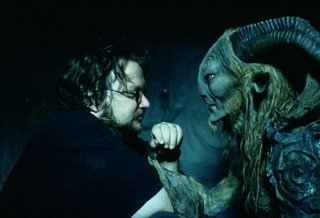
Andy Horbal asks an interesting question: Is “Pan’s Labyrinth” really that much better than “Mirrormask” or “Tideland”? [here] Guillermo Del Toro's film, currently in theatres, is one of the best reviewed films of the past year (96% positive reviews at Rotten Tomatoes). Terry Gilliam’s “Tidelands” was one of the worst-reviewed (at 25%) while Dave McKean’s “Mirrormask” (story by Neal Gaiman; visual effects by Jim Henson’s old company) came in at a so-so 51%.
All three films are basically the same story – a retelling of “
Part of the answer, I suspect, is current fashion. Del Toro is considered to be “hot, hot, hot!” He’s a talented, young Mexican director, plugged into the comic book culture, and promoted by Quentin Tarentino. Comics have been the major source of inspiration in
And there, I think, we have found the key. Like “The Conformist,” Del Toro’s fantasy is a strident indictment of fascism in particular and bourgeois society in general. In “Labyrinth” every canard of
Critics have misjudged Del Toro’s work. They almost unanimously characterize his dual-track story as a skilful interweaving of fantastic and realistic narratives. But in fact both narratives are fantasies, one born of children’s fairy stories, the other of Marxist legend. It’s just that the critical community, as currently composed, finds Del Toro’s fantasies congenial and politically useful. And, for that matter, the stories are not very well inter-woven. They do not resonate with one another on any level, not even as dialectical opposites. They are nothing more than simplistic, logically inconsistent fantasies told in fragmentary style. Nothing more.
Guillermo Del Toro is a talented director. He has a wonderful visual style, but if he is ever to fulfill his promise, he will have to grow up and come to terms with the real world rather than the tedious comic-book fantasies he currently inhabits.
Parenthetically, I might note that the critical community took the release of Mel Gibson’s adventure fantasy “Apocalpto” as an opportunity to engage in pop psychological speculations on the director’s presumed pathologies. One might do much the same for Del Toro. On the evidence of his films he was a pathetic loser as a child, living in fear of school bullies, retreating into the fantasies of films and comic books, indulging in bloody adolescent supernatural power fantasies filled with vampires, vengeful ghosts, hell critters, cannibalistic demons, and the like. He probably hated his father and may have had homosexual tendencies; at the least he was not at all popular with the ladies. Their approval of his work suggests that many mainstream critics share much the same set of obsessions and psychological problems.
Of course all of this is BS – I know nothing of the character or nature of Guillermo Del Toro, other than what I have seen in interviews he has given. My analysis has no more, and no less, value [that is to say none] than the speculations made by mainstream critics into the character of Mel Gibson, whose “Apocalypto” was a far superior effort to any of the three recent films referenced here. Don’t waste your money on “Pan’s Labyrinth.” Rent “Apocalypto” instead.
No comments:
Post a Comment